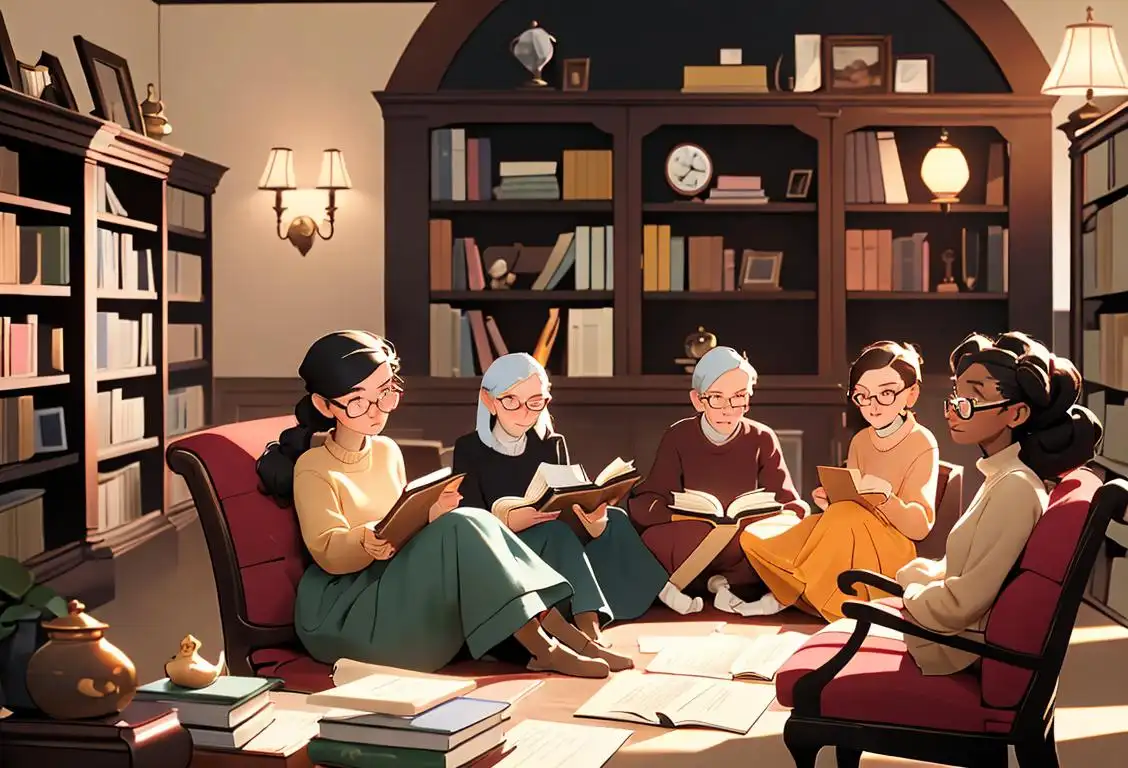National Library Day

Welcome to National Library Day! Get ready to embark on an epic literary adventure and dive headfirst into the wonderful world of books, knowledge, and cozy reading nooks. This is the day when we celebrate these magical places filled with endless stories and imaginative journeys waiting to be explored.
When is Library Day?
It's national library day on the 6th February.
The Birth of National Library Day
Every year on the 6th of February, bookworms and library enthusiasts from all corners of the globe come together to honor the treasures that libraries hold. The idea behind National Library Day is to recognize and appreciate the vital role libraries play in education, research, and culture.
Although the exact origins of National Library Day are somewhat mysterious, one thing is for sure – it has gained significant traction online. With 636 mentions detected on this special day, it's clear that people love to spread the library love!
A Portal to Endless Knowledge
Libraries are extraordinary places that provide free access to a wealth of information, allowing anyone to explore the vast universe of literature, reference materials, and digital resources. They offer a safe haven for escapism, learning, and discovery.
Whether you're delving into the realm of fiction, conducting research for a school project, or simply seeking solitude amidst the comforting scent of books, libraries have something for everyone. From enchanting children's collections to historical archives, libraries are the heart of communities, fostering a love of learning and intellectual growth.
The Joy of Borrowing Books
One of the chief joys of visiting a library is the ability to borrow books. With National Library Day, it's the perfect opportunity to dust off your library card and take advantage of all the incredible stories waiting to be brought home. From thrilling novels to heartwarming tales, there's no limit to the adventures you can embark on with borrowed books.
So let's make National Library Day a day of literary exploration and appreciation. Visit your local library, borrow a book (or several), and lose yourself in the pages of wonder and imagination!
History behind the term 'Library'
2600 BCE
The Ancient World: The Royal Library of Ashurbanipal
In the Ancient World, the Royal Library of Ashurbanipal, located in Assyria (modern-day Iraq), was established as one of the earliest known libraries. This great library contained over 30,000 clay tablets and was curated by Ashurbanipal, the last great king of the Neo-Assyrian Empire. The tablets held a wealth of knowledge on various subjects, including religion, literature, history, and science.
300 BCE
The Great Library of Alexandria
One of the most renowned libraries in history, the Great Library of Alexandria, was founded in Egypt during the reign of Ptolemy I. It became a center of learning and attracted many scholars from around the world. The library held an extensive collection of scrolls, estimated to be between 40,000 to 400,000, covering a wide range of disciplines such as mathematics, astronomy, medicine, philosophy, and literature. Sadly, the library was destroyed over time, and its exact location remains a mystery.
7th Century CE
The Islamic Golden Age: House of Wisdom
During the Islamic Golden Age, a significant cultural and intellectual flourishing occurred. The House of Wisdom, established in Baghdad in the 7th century, served as a major intellectual center. Scholars from different cultures and backgrounds gathered there to translate and preserve ancient works, laying the foundation for the preservation of knowledge. The library played a crucial role in translating Greek, Persian, and Indian works into Arabic, thus aiding the development of many scientific and philosophical fields.
1444
The First Public Library: The Malatestiana Library
The Malatestiana Library in Cesena, Italy, is recognized as the first public library in Europe. It was commissioned by the Italian condottiero Malatesta Novello and designed by the architect Matteo Nuti. Open to the public, the library housed a collection of codices and manuscripts, reflecting a shift towards accessibility and sharing knowledge with the broader community.
1712
The Birth of Copyright Libraries: The Copyright Act
The Copyright Act of 1710, also known as the Statute of Anne, was enacted in England. This key legislation introduced the concept of legal deposit, which required printers and publishers to provide copies of their works for preservation in specified libraries. This paved the way for the establishment of copyright libraries, ensuring the availability of cultural and intellectual works for future generations. The British Library, founded in 1753, is one example of a copyright library.
1876
The Modern Public Library: The First Free Public Library
The first free public library, the Peterborough Free Public Library, was established in Peterborough, New Hampshire, USA. The concept of a public library, where books were freely available to all members of the community, expanded across the United States and became a model for public library systems around the world. These libraries played a key role in promoting literacy, education, and equal access to information.
20th Century
The Digital Revolution: Libraries in the Digital Age
The 20th century witnessed a significant transformation in libraries due to the advent of technology. With the development of computers, the internet, and digital storage, libraries began to embrace digital formats. This allowed for the preservation and accessibility of vast amounts of information and enabled libraries to provide digital resources, including e-books, online databases, and multimedia materials. Libraries now act as hubs of digital information and knowledge, adapting to the changing needs of the modern world.
Did you know?
Did you know that the world's largest library is the Library of Congress in Washington, D.C.? It houses over 160 million items, including books, photographs, maps, and manuscripts. You could spend a lifetime exploring its vast collections!Tagged
awareness fun loved onesFirst identified
12th March 2015Most mentioned on
6th February 2016Total mentions
636Other days
Compliment Day
Cheese Pizza Day
Pumpkin Day
Medal Of Honor Day
Guac Day
Foundation Day
Suicide Prevention Day
Memorial Day
Cancer Survivors Day
Bacon Day









